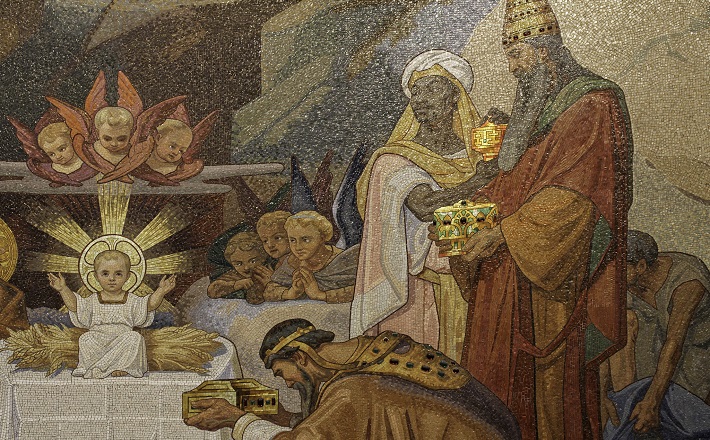Commentary on Matthew 2:1-12
“Gospel” originally meant the “good news from the empire” — namely, when a new territory was conquered, when an elite child was born — but Mark changed the meaning to “good news to the poor.”
“Advent” originally meant the coming of a royal person or a high dignitary, but the gospels changed that meaning to the coming of the poor Jesus of Nazareth. “Epiphany” originally meant the abrupt manifestation or showing up of a sovereign to inspect a subordinate; but the gospels changed the meaning to the appearance of the poor Jesus of Nazareth to inspect the powerful.
Up until the 4th century, Jesus’ birth was celebrated on January 6. However, in 325 the emperor Constantine moved that festivity’s observance in the Western Church to December 25, the day of the Sol Invictus, the Unconquered Sun, whom he worshiped. January 6 then became related to Jesus’ baptism.
Three Kings and bondage liberation
In Puerto Rico, the Three Kings Day warrants great celebration, in which businesses are closed and the whole country is feasting. This is a cultural vestige that takes us back to the slavery time when January 6 was the only day off in the entire year for the Afro-Caribbean people. Needless to say, the black king (Melchior) is always at the center.
In the Eastern hemisphere, Epiphany is the celebration of Jesus’ baptism, where the “three magi” became the first liturgists who celebrated the birth of the political Messiah: “the king of the Jews.” These “three scholars” were also the first Gentile missionaries to share the good news to the Gentiles beyond Judea’s borders.
People sometimes joke that this trio was the first and last group of men invited to a baby shower, since their presents were not practical at all!
State paranoia
Herod was an “illegal alien” since he was not an Israelite but an Idumean with many connections with the Roman Empire. Jesus has royal blood (Matthew 1:1-17) but the “alien” Idumean has the sword of Rome in his DNA. When the visit of the three magi took place, Herod was ready to die after 40 years of ruling the Israelites on behalf of Rome (40-4 BCE). He was able to maneuver all that time in power due to police brutality and his cruel profile. And he is still frightened with the news of the magi, the intriguing royal child and the talking stars. Herod considered that news a concern of “national security.” His politics, based on secrecy and terror, are still mimicked by current Herods who don’t listen to Martin Luther King Jr.’s prophetic speech: “History is the long and tragic story of the fact that the privileged groups seldom give up their privileges voluntarily.”1
Herod, the pious politician
Politicians learned from Herod the language of piety, to grant God’s blessing to the country, to be politically correct and to promote, with the people’s blood, the grandiose temple construction as his majestic work in the capital city. Herod’s Jerusalem temple was the main business of Jerusalem with multi-purpose roles: military fort, bank, IRS, butchery, and also a place to worship God.
Under the guise of “paying homage” to the newborn baby, Herod hides his intentions of expunging the baby from the map, and removing him from history. However, he didn’t live to carry out that killing. That accomplishment belonged to his son, Herod Antipas. What Herod the Great (very proud of his humility) achieved was to massacre the first martyrs of the Christian church with his killing of the innocent children around Bethlehem.
Melchior had means
In today’s culture, Africa is often equated with poverty; however, not all Africans who crossed the Atlantic were slaves. Caribbean hermeneutics reminds us that black Melchior was African and had economic means. In fact, during the Middle Ages, Africans were portrayed as distinguished, with dignity and pride. Africans who were professionals and well to do traveled to the America continent in the European ships and often stayed for business as well.
I buy therefore I exist
The liturgical year has been co-opted by the market year where everything is for sale. “Three Kings Day” is the crowning of the toy race started with Santa Claus. In recent years the bridge between Christmas and Epiphany sees the consumption of 80 percent of the annual toy sales. Instead of addressing the political dimensions of both festivities, folks only care about buying the love of their children through toys. Electronic devices are already hanging in the cradles of months-old babies.
Gospel obedience
The wise men of our story, like our ancestors, got their wisdom also from dreams, where we are more awake than during the vigil. Little wonder, then that on the Day of Pentecost we see “youngsters dreaming dreams” (Acts 2, quoting Joel 2). Maybe while dreaming, the creative unconsciousness of these Easterners allowed them to see the evil that Herod tried to conceal behind a pious mask.
The Magi didn’t pay attention to Herod’s insinuation: “When you find him, bring me word so that I may also go and pay him homage.” They knew that in politics an insinuation is an order, but our three heroes opted for Gospel obedience. The three kings, like Peter (and us), have a higher loyalty: “We must obey God rather than any human authority” (Acts 5:29).
Notes:
1 Martin Luther King Jr., “Equality Now: The President Has the Power,” in A Testament of Hope: The Essential Writings and Speeches of Martin Luther King, Jr. James M. Washington (ed.), San Francisco: Harper & Row, 1986, 292. Quoted in Brian K. Blount (ed.), True to Our Native Land: An African American New Testament Commentary, Minneapolis: Fortress Press, 2007, p. 88.


January 6, 2016